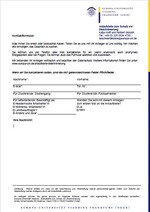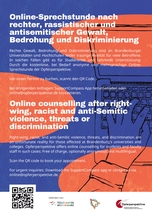FAQs
The contact point for protection against discrimination is the central point of contact if you have been discriminated against. You can also contact various counselling centres and commissioners. You can find an overview here: Counselling centres
Then contact the contact point for protection against discrimination and together we will see who can help you.
First of all, there are various counselling options open to you, which we recommend in any case in advance of any possible solutions. You can counselling centres as well as representatives and confidants here: Counselling centres
After that, professional conflict resolution (mediation) between the parties involved may be an option, for example. However, you can also follow a formal complaints procedure. In addition, there are other options, which, however, cannot be listed individually depending on the individual problem.
Filing a formal complaint means that the person concerned wants to initiate a defined procedure. Accordingly, they describe the incident to the contact point for protection against discrimination (= complaints office) with the aim of initiating proceedings. On the contrary, an informal complaint can be communicated, but this does not result in the initiation of proceedings.
All members and affiliates as well as guests of Viadrina. Who counts as a member/affiliate is defined in the Viadrina's Basic Regulations.
A complaint can be submitted in writing or verbally.
Please contact the contact point for protection against discrimination (= complaints office) or send us the complaint form. You can also anonymously describe a case you have experienced/observed.
However, anonymous complaints can only indicate grievances. It is difficult to deal with them concretely.
We would like to encourage you to seek a confidential discussion with us.
Discriminatory incidents do not always happen on university premises, but they do have a connection with the Viadrina - if you are unsure, please seek discussion with us.
Yes. The confidentiality of the procedure and of all those involved in the procedure will be respected.
You can remain anonymous when contacting the contact point for protection against discrimination and receiving confidential counselling. Then we can listen to you and show you alternative courses of action. In a formal complaints procedure, the person making the complaint is not entitled to anonymity, as the person accused of misconduct must be given a hearing and the opportunity to make a statement.
Yes, you can be accompanied or represented by a trusted person.
No. However, it is easier to find solutions if an incident did not occur too long ago. Note: Criminal offences may be statute-barred by law. A formal complaint does not affect the statute of limitations.
You can find the individual procedural steps here: Complaints procedure
This varies and depends on the respective case constellation. We strive to hold talks promptly and to make the procedure efficient.
No, we usually only take action upon request. But in cases of criminal or disciplinary conduct, we pass the proceedings on to the University's Executive Board, which may take further steps (e.g. criminal charges).
Sanctions and further measures always depend on the individual case and on the respective service, labour or university law provisions for the respondent. The following measures and sanctions are possible:
- a verbal or written instruction
- a written admonition or warning
- the holding of an interview
- a transfer within the EUV
- the imposition of a disciplinary measure
- a dismissal
- withdrawal of a teaching assignment
- exclusion from the use of EUV facilities
- exclusion from participation in courses
- exmatriculation
- the imposition of a house ban
- compulsory participation in anti-discrimination measures
The University's Executive Board or the regulations committee, if it is responsible.
From the uUniversity's Executive Board.



